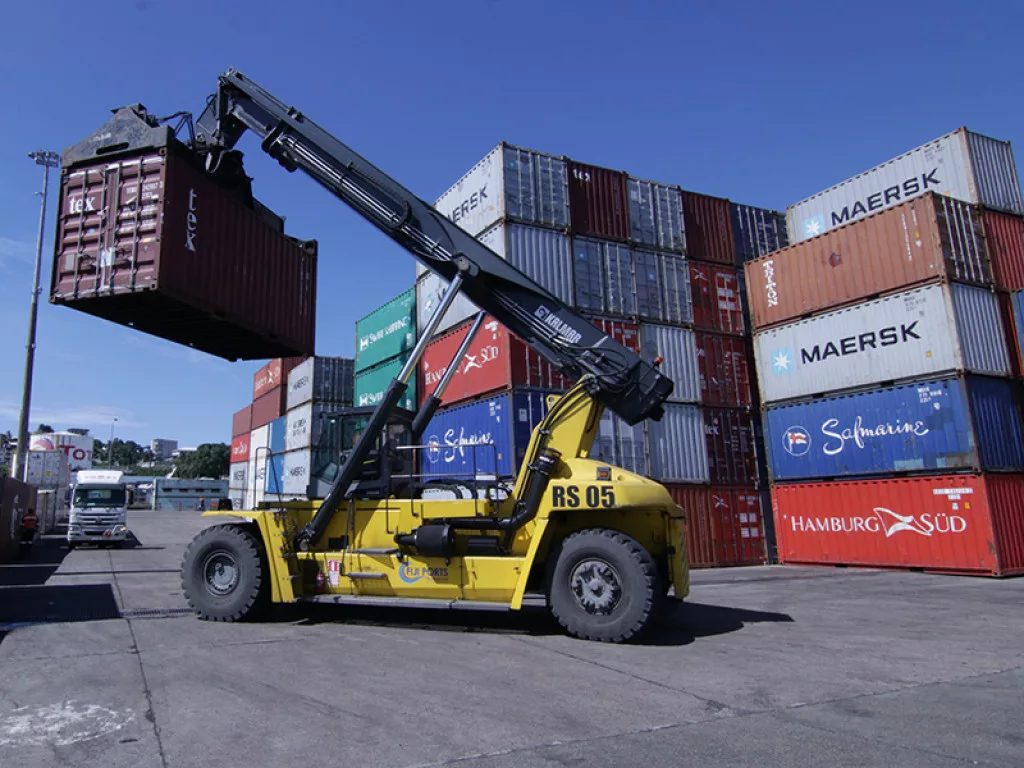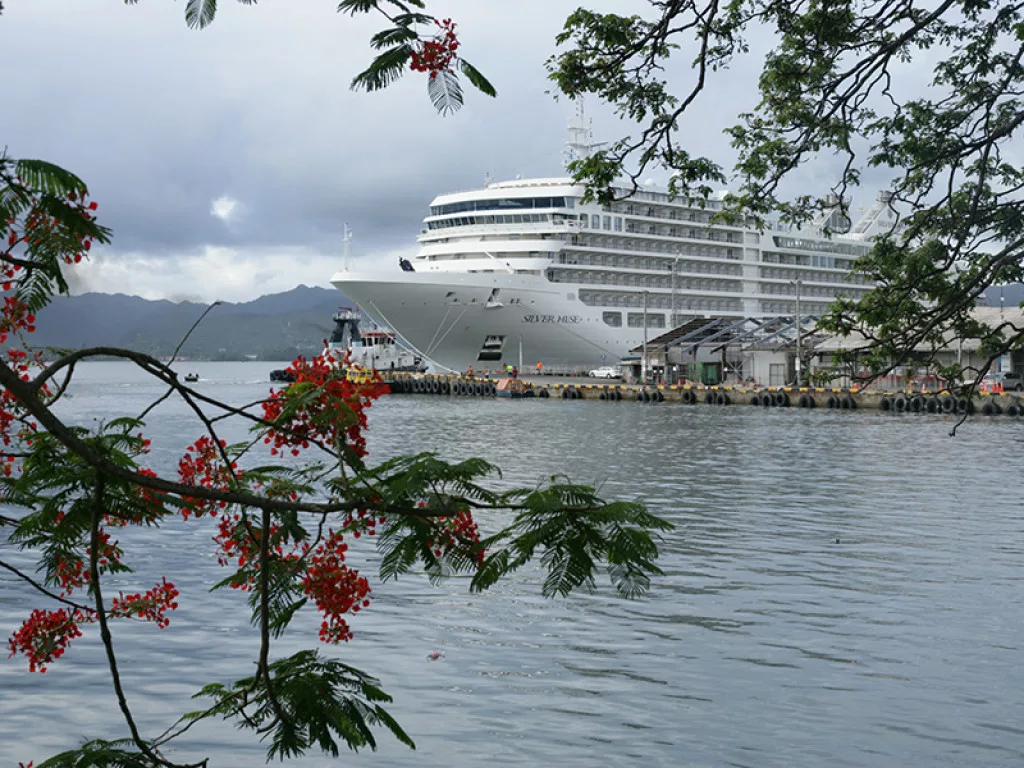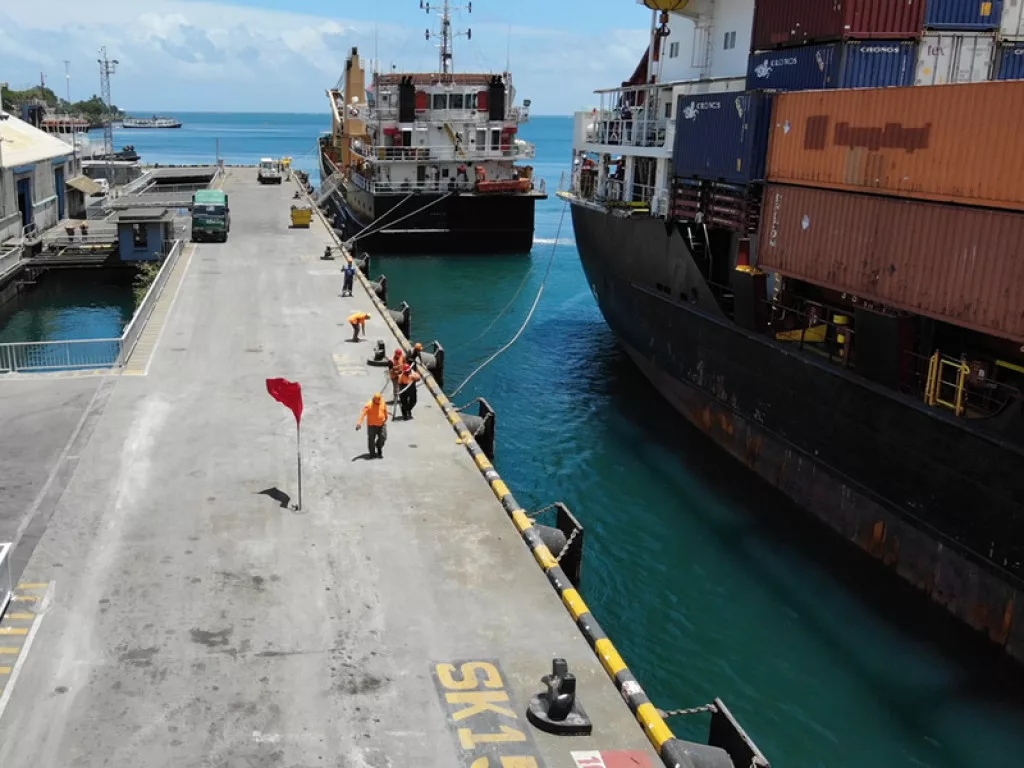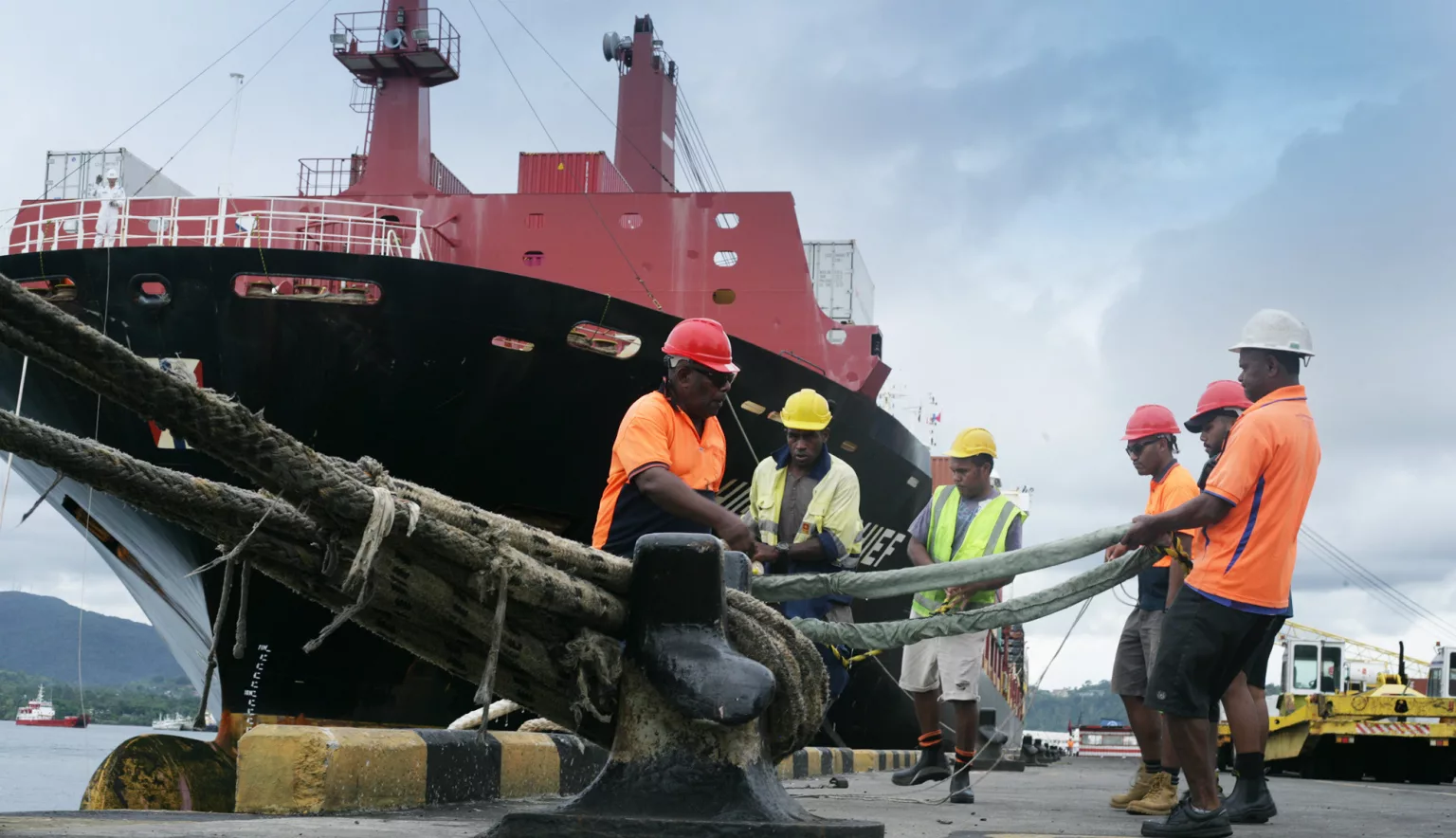Fiji Ports Corporation Limited (FPCL) is reinventing shipping operations across Oceania. We discuss the company’s mission of becoming the Smart Green Gateway for Trade to the Pacific Region with FPCL CEO, Vajira Piyasena.
BACK ON AN EVEN KEEL
Shipping is the crux of worldwide trade. In an archipelagic nation such as Fiji, the nation’s ports are the indispensable gateway for imports, perhaps most significantly the foods on which the country is most dependent. Indeed, in Fiji, the strength of its ports is intrinsically linked to the stability and economic development of the country itself.
“Every decision and performance at FPCL contributes significantly to the regional maritime and port networks, and not just to Fiji but of international significance as well,” opens VajiraPiyasena, CEO of Fiji Ports Corporation Limited (FPCL).
As the national port management company to provide regulatory oversight for the ports of Suva, Lautoka, Levuka, Vuda, Malau, Rotuma and Wairiki, whilst additionally providing operational supplies and service provision through sub-contractors, FPCL stands as a Public Private Partnership (PPP) benefitting from the collaboration of both sectors.
“Fiji needs a nationally coordinated approach to the future development and planning of its regional ports and associated infrastructure,” Piyasena attests.
Complimentary to this, FPCL’s subsidiary company, Fiji Ships and Heavy Industries Limited (FSHIL) and the group’s associate company, Fiji Ports Terminal Limited (FPTL), also have varying shareholdings.
For Piyasena, the corporation at present continues to buffer the headwinds that present a universal threat to the worldwide shipping network – primarily the impact of COVID-19 on the cruise vessel tourism and maritime industry that has triggered worldwide operational bottlenecks and supply chain disruption.
“We recognise that global economic and societal trends will always be a challenge,” Piyasenacomments with reference to the above. “So too are the changes that require technological and operational innovations for greater energy efficiency and economic competitiveness.”
Indeed, this competitiveness pertains to the entire FPCL corporation’s current laudable mission to become ‘the Smart Green Gateway for Trade to the Pacific Region.’
The corporation spans seven ports across the Fijian seaboard, and numbers approximately 90 staff as of 2021, in addition to 63 registered relieved workers (RRW). As the stronghold for trade into the Pacific, FPCL benefit and seek to fully exploit Fiji’s strategic position as a transhipment hub.
“While FPCL’s core business centres on servicing national and regional business and public needs, Fiji is strongly positioned to provide transhipment to other Pacific Island States and Territories.”
“The competitiveness, and indeed survival, of many of our national businesses rely upon our ports and related logistics chains. In turn, these factor impact on afford-ability of goods, and national wage expectations”
Vajira Piyasena, CEONAVIGATING THE PANDEMIC
Despite COVID-19 disrupting the livelihoods and economies of the Pacific Island countries, Fiji Ports Corporation Limited persevered in operations and held fast in spite of troubled waters.
“During these unprecedented times of the COVID-19 pandemic, FPCL has been able to maintain its connectivity with the rest of the world, which has been vital to the continuity for the company’s operation and for the economic stability of Fiji as a whole.
“Whilst international borders remained shut for the most part of 2020 and 2021, Fiji Ports has been at the forefront of border control ensuring that COVID-19 protocols are followed to facilitate international and domestic trade and assisting the Fijian economy to withstand some of the COVID-19 impacts,” Piyasena comments.
“Although International borders remained closed, only in April 2021, Fiji contracted its first COVID-19 case and immediately regional borders were also locked down. FPCL’s two major ports are in Suva and Lautoka, both of which were completely locked down. Due to the lockdowns, the logistics were an issue and it required FPCL to engage external parties to manage the logistics outside of the lockdown areas which yielded an additional expense to the company and caused operations to halt until an alternative solution could be obtained.”
Limited resources remain a challenge, yet championing a culture and vision of resiliency, FPCL conveyed clear messages of support across the company’s operations.
“Our message is ‘in an unprecedented time, mistakes are luxuries that no one at FPCL can afford’,” Piyasena states.
“Management spent considerable time and effort in ensuring its operations ran smoothly without making staff redundant or any reduction in staff wages and salaries.”
Fortunately, throughout the duration of the pandemic, FPCL maintained its staffing level and even introduced new positions to cater to the ambitions of the company’s strategic five-year plan, bringing on board new talent and fresh potential.
“Growing trade through Fiji’s Ports in a sustainable manner that will optimise returns remains vital to FPCL”
Vajira Piyasena, CEO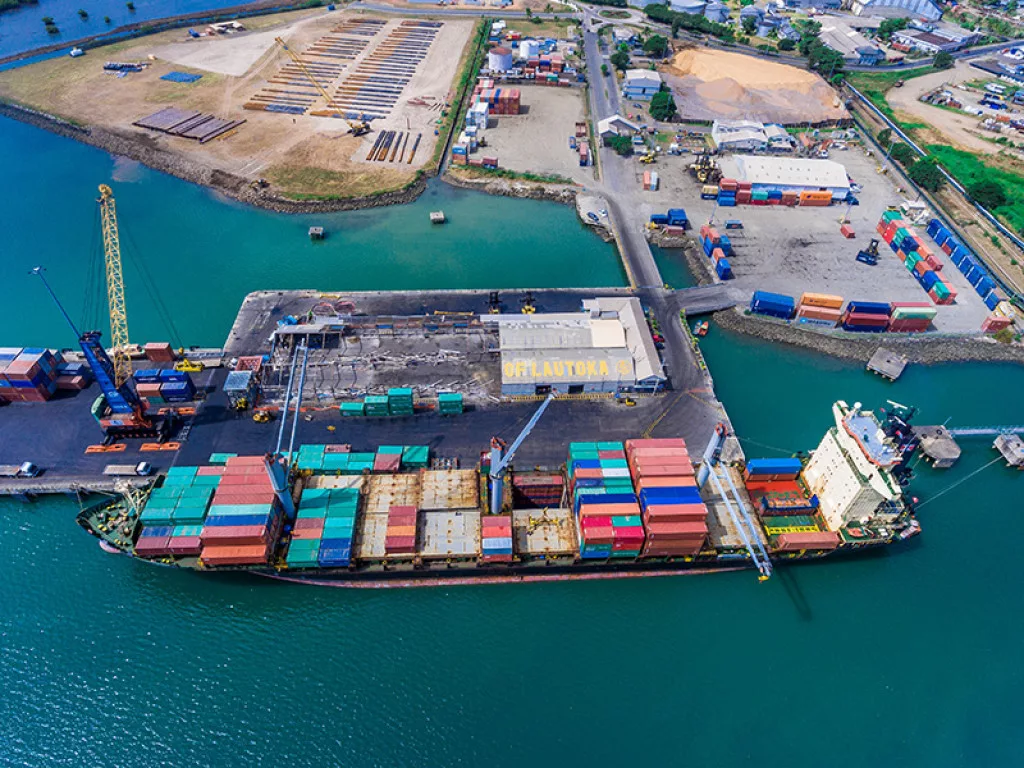
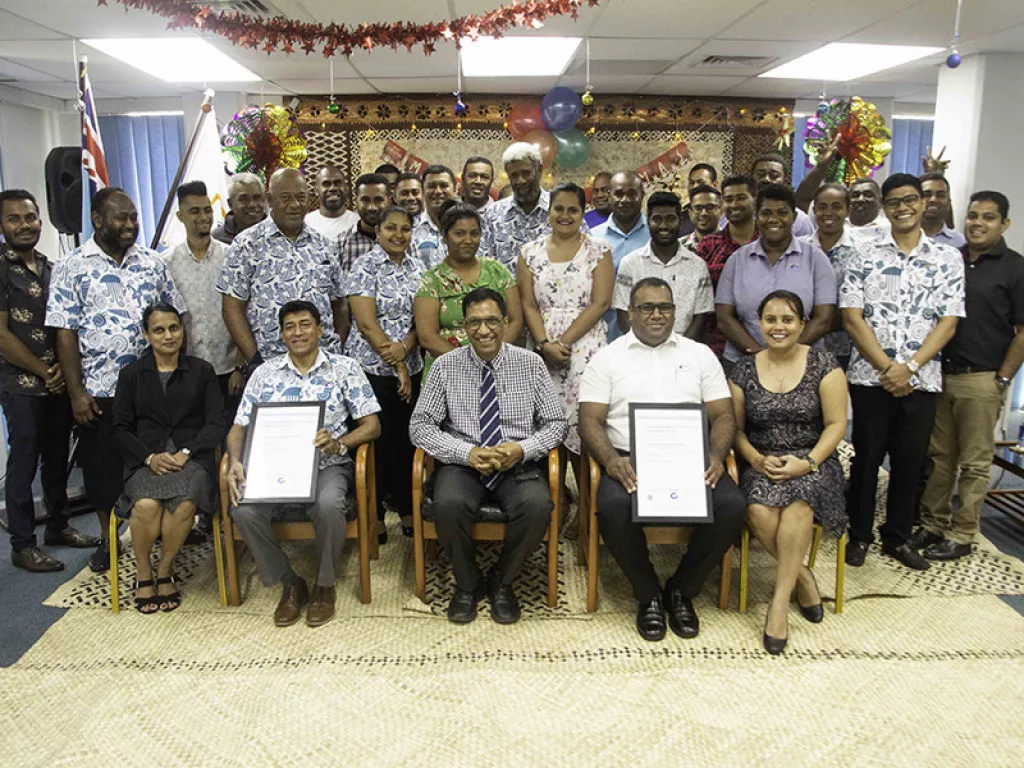
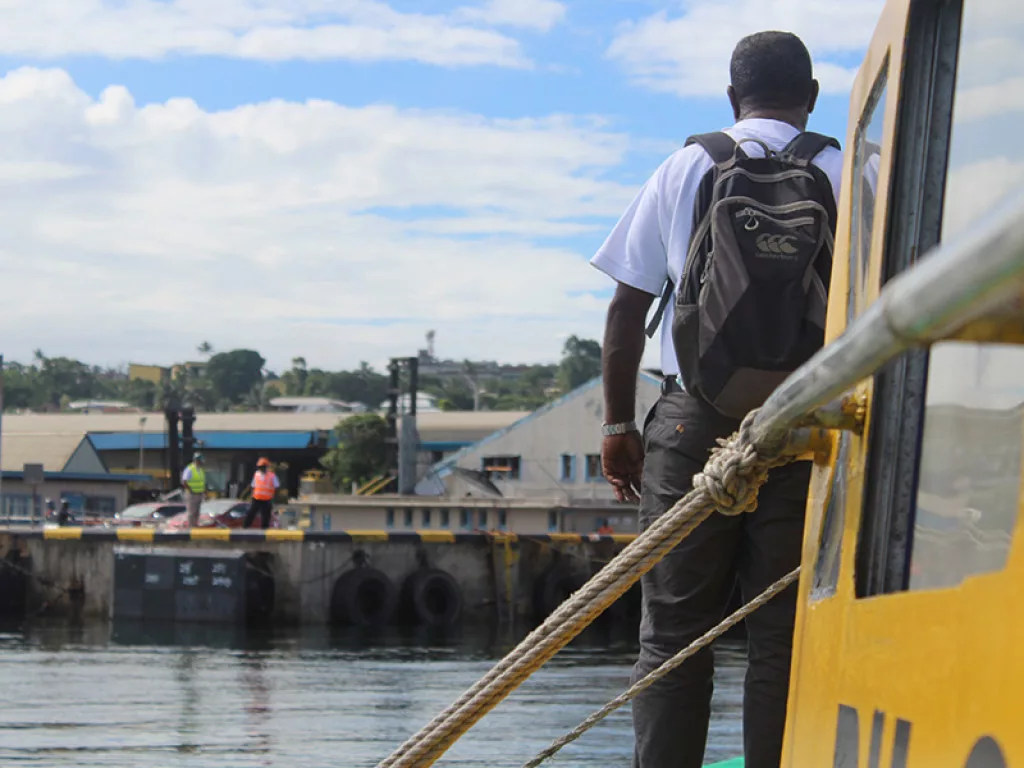
CHARTING A GREEN COURSE
Fiji Ports Corporation Limited is not just seeking recovery, but rather improvement, to become a key cornerstone in the sustainable development of Fiji’s ports and logistics sectors.
For FPCL, what is today a modern buzzword is nothing new, since the company was first alerted to the pressing needs of addressing environmental sustainability after attending a ‘Green Ports’ conference in Japan back in 2011. Subsequently, FPCL has responded with a programme of well-structured changes following an energy audit in 2016, supported with funding from the South Pacific Community (SPC).
“FPCL is becoming a leader in its industry. Fiji is one of the first two nations to commit to reaching net zero emissions by mid-century and is the 11th nation to have submitted its Low Emission Development Strategy to the United Nations, in line with Article Four of the Paris Agreement.”
FPCL’s ability to embrace the technological advances impacting the development of Smart Ports is paramount in establishing a reliable and competitive transport network.
“By leveraging essential cooperation between the public and private sectors, smaller Ports of Entry in Fiji can take advantage of technological advances to create ‘Smart’ systems which FPCL Port of Suva currently provides with our Vessel Traffic Management System (VTMS) which is being installed,” he tells us.
FPCL’s aforementioned five-year strategic plan (2018-2022) embodies the corporation’s aspirations to become a truly dynamic business environment in this regard.
Through this strategy, the port will meet key challenges and leverage opportunities to achieve its goals.
“The plan addresses the physical, operational, economic, environmental, and recreational requirements of the company. It forms the basis for strategic policy for effective resource utilisation and efficient service delivery,” Piyasena comments.
This comprehensive strategy advocates a heightened focus on the reduction of carbon emissions on land, maritime, and domestic aviation airport.
“FPCL remains committed to implementing ways to reduce our carbon footprint and reducing Green House Gas (GHG) emissions in our operations, and doing so with cost effectiveness in day-to-day activities,” he expands.
FPCL began this process with an emphasis on the management of both hazardous and non-hazardous waste generated by activities at Fiji’s ports, which prompted the installation of an electric incinerator replacing the oil-fired incinerator that had harmful emissions.
As part of the ‘FPCL Green Port Initiative’, the company also undertook key upgrades on its Muaiwalu Two facility, designed to ease car park congestion, whilst also equipping the building with solar technologies including a roof top solar system and solar powered car park lights to make it a net-zero facility in terms of electricity usage.
“Aligning with the FPCL’s Green Port Masterplan, this will not only be beneficial to FPCL but to the general public that commute through the interisland ferry services.”
Reflective of FPCL’s laudable ambitions, the company is presently engaged in undertaking several projects that pertain to their Smart Ports goals. This includes the implementation of Vessel Traffic Management Systems – a new system acquired from Australia, FPCL are currently awaiting borders to reopen to proceed with installation. This will modernise vessel traffic control at Suva Port, and if successful, it will also be implemented in Lautoka.
Meanwhile, FPCL are also upgrading to paperless, automated systems such as with a new berthing application process.
“The Berthing Application System is also in line with the FPCL’s Green Port initiative, in support of the FPCL’s vision, to work smarter by harnessing technology wherever possible. It also promotes increased digitisation and provides the means for continuous improvement through further analysis and reporting. It increases efficiency by saving resources, time and money, and is environmentally friendly,” Piyasena explains.
Leading with strategy and ambition, Fiji Ports Corporation Limited are on a promising course in the turbulent wake of the past 18 months to develop ports of the future.
“Whilst there has been progress, there is always more that can be done and requires appropriate prioritisation, with regards to everything from a national approach to collaboration between government and industry.”
